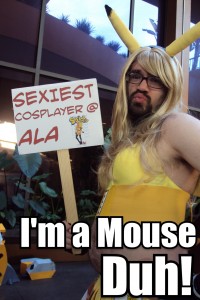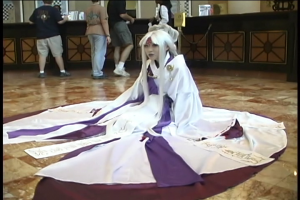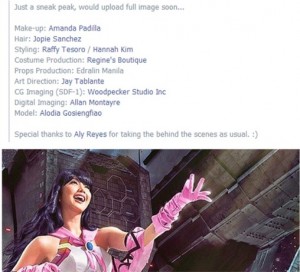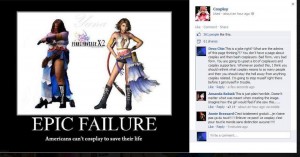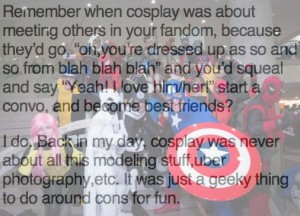Preface: This is not a critique on cosplayers that dress up as sexy and scantily clad outfits, but the culture wherein cosplayers that gain fame because they’re known for dressing sexy.
This has been going back and forth in my mind on whether or not I should write this editorial. Everytime I see a new post about fake geek girls, slut shaming, harrassment, etc directed towards “sexy cosplayers,” discussion always erupts into madness. There’s been a lot of talk about the Vampy’s, the J.Nig’s, the Tanya Tate’s, the Ivy Doom Kitty’s, etc. My feelings were always towards, “If it makes you happy and it’s not harming anyone, cosplay as you please.” When Man Faye got popular, I was still apathetic towards the his hairy butt. Anything that builds unnecessary hype, I tend to ignore and do my own thing. However, issues regarding “sexy cosplayers” are often hard to ignore. Remember the episode of South Park where everyone was focused on what Britney Spears is doing next? The past few days the cosplay community was on Jessica Nigri Watch after a recent incident involving copyrighted material and a photographer. It’s a lot like that; lots of gossip, assumptions, rumors, etc that I just do not want an earful of. At the end of the day, I just want to cosplay as my favorite characters.
However, there is no denying this has changed cosplay culture. While you do have your echelon of queen bees, you also have the wannabes – the girls that want to rise to the same type of fame and then you have the wallflowers – the types that don’t want to give a hoot, but can’t ignore it because we’ve created our own TMZ out of it. In a way, it feels like high school – you have the super pretty and popular girls that every hetero guy wants to party with. Then you have the wallflowers who just want to do their own thing. There’s been certain signs and symptoms to this shift in culture. I’ve been active in the cosplay community since 2000 and well, what can I say…it’s different.
- Queen Bees: Sex Sells
A marketing tactic as old as time. In the USA, a grown adult dressing up in a costume is often associated with sex appeal. Look at most Halloween store websites and you’ll find sexy versions of Big Bird, Ninja Turtles, Michael Jackson, etc. It’s no surprise that these cosplayers get the popularity they get because well, they do have the body types that would suit professional modeling and costume choices are on the skimpy side. Even when making girl versions of a male character, the alternative points to sex appeal.
I’ve seen people make the argument that it would not be so bad if the cosplay repitoire was not cluttered with just skimpy cosplay. This is not a slight on cosplayers who do skimpy clothing – it takes patience doing a zig zag stitch on lyrca when you’re serger-less. However, I do question when photos of empowering female characters are taken in a way that is to titillate than to reproduce a shot. I’m cool with Cammy victory poses, but when the photo is composed to look more like a FHM or Maxim shoot, that’s when I start to question. Who is it for? How does this show empowerment for the character? How is showing off one’s bare ass or a close up of the breasts showing off craft?
More importantly, it’s also the reception that it is getting from the targeted male audience. When J.Nig posted that she was doing a breast cancer fundraiser, comments were focused on her body than the actual cause itself. Male followers are just as to blame for this new cosplay culture. Frankly, I get that males will like anything that’s shiny and has boobs. Yet, I’ve just seen the worst come out of guys regarding comments towards sexy cosplay photos. When guys are proud they think of a sexy cosplayer during intimacy with their spouse or girlfriend, it gets really disgusting.
2. The Wannabes: Remnants of an Instagram Culture
When there are queen bees, there are the wannabes. Rosalind Wiseman covered this well in her best selling book, “Queen Bees and Wannabes.” There’s always going to be the wannabes. These are the people who want just as much fame, but are very desperate in doing so. I’ve encountered Freshmen cosplay girls – girls who are new to the hobby – who cite J.Nig as their role model. While I did admire Yaya Han in her early days, it was more for her craft than her looks and popularity. I wanted to make something amazing as her Hinoto. However, I’ve seen a crop of Instragm-esque shots of girls in the most overdone makeup and low cut tops posing sexy with controllers pop up. They want to replicate sexy gamer girl poses done by models. Even with that, I was never a fan of the trend. It does not reflect who I am as a gamer and neither does it reflect my lady friends who enjoy gaming. So, when I see a model wearing nothing but a power glove and covering her breasts with said power glove, “No, that’s not a reflection of all girls who enjoy video gaming. It’s a hyper sexualized and unrealistic standard done by a marketing company to titillate adolescent boys.”
If it’s not reshares of sexy-geek-girl-with-controller, it’s this race to get the most likes on Facebook. When J.Nig’s numbers were above 100,000, that’s when I started seeing more Facebook pages for cosplay pop up. I have no problem with cosplayers having “like pages.” I do have a problem when it becomes a numbers game. What’s the point of getting to X amount of likes on a Facebook page. Takopop wrote a very interesting article about this trend. Is it really worth it to gain so many likes? I thought cosplay was a craft – how you present yourself and how you level up your sewing abilities, not a popularity contest.
One of colleagues mentioned he had a friend who worked in a North Carolina Walmart. The retail employee, a cosplayer on the weekends, found a couple of otaku wandering around Walmart to find cosplay supplies. The conversation went something like this.
“Hey! You seem cool! Do you have a Facebook page so we can keep in contact?”
“No, I just have a private profile.”
“Whatever, only REAL cosplayers have Facebook pages!”
Facebook like page numbers do not validate self esteem or worth as a cosplayer. This new culture has set unrealistic expectations that numbers of likes could mean popularity and perhaps a shot at being at guest at an anime or comic book convention. Instead of progress photos, it’s instagram photos that’s close ups of body parts being passed off as progress rather than the project itself. It’s sad that girls are falling into this wannabe culture. I’m fine with people wanting to be fitter (as opposed to obsessing over thinness), but when it is about pleasing others than yourself, it’s a sad way to live.
“The more you change yourself to fit an elusive, ever-changing standard, the more insecure you feel. The more vulnerable you are to self-doubt, narcissism, and confusion—because you aren’t getting the kind of attention and acceptance you sacrificed so much for.” – Rosalind Wiseman
I have also seen this rush to monetize the hobby, not by commissions, but by selling autographed photos. I was talking to a longtime colleague that has been competing in masquerade for as long as I have, she tells me that it never crossed our minds to sell autographed photos of ourselves. I started to see this pop up on my news feed that people were selling autographed prints and it was from average hobbyist cosplayers. If every cosplayer suddenly goes into selling autographed prints, then what’s the point? Cosplay is no longer an art or a craft when it reaches this point. Focusing on monetizing the hobby is really sad; why charge for autographs – it’s just a hobby.
3. Cosplay is the New Black
The last editorial I posted was interpreted as a “should cosplayers be guests at cons?” type of discussion. While readers will interpret how they wish, I will pose the discussion more in depth here. I have no problems with cosplayers as guests so as long as they have something interesting to contribute that’s more than just being a cosplayer. What do they give back to the community? How can they inspire a someone in fandom to be a better fan? For example, there are cosplayers that have gone on to take their hobby as a career. Jezeroth designs for various Las Vegas shows, Miko works for RuPaul, and even some have gone onto professional voice acting for anime and video games. They are guests not because they cosplay, but they have something interesting to tell. I’m also cool with cosplay musical guests like Mikarin and performing groups like Angel Hearts.
What I’m not cool is when conventions assume that the queen bees should be guests because “they are industry.” Cosplay is meant to be a hobby, ideally, a fun hobby. When conventions start validating that it’s okay to have sexy cosplayers as guests, it inspires desperation in the wannabe scene. I’ve seen more wannabes become vigorous on getting X number of likes to have this opportunity to get convention appearances as a career. Sorry to burst your bubble, but convention appearances and tours is no way to make a living. I even tell this to aspiring and amateur voice actors who assume that anime voice acting is a stable career move when it’s really not. Instead of campaigning for popularity, there’s always volunteering and organizing panels at conventions. You get your name out there by working for it, not by expecting people to “like” you.
Another point to bring up is one of the reasons why queen bees are validated as guests at anime conventions is because a lot of cosplayers happen to show up a cons. A colleague who works for Anime Conji has mentioned this to me in a Facebook discussion. Cosplayers don’t really want to see other cosplayers. Cosplayers want to meet and greet the people that made the shows they’re cosplaying from. With that said, because there’s so many people cosplaying from Sailor Moon characters this year, it’s more of a sign to get Sailor Moon related guests rather than asking for a Sailor Jamboree reunion.
4. Unrealistic Standards of Beauty Set a Record Low
As a Communications major, at one point, a girl has to write about “body image, self esteem, and the media.” I can go on for hours and discuss about unrealistic standards that the media produces. What I’m concerned about is how this culture – by conventions validating it, fanboys liking it – affects the typical fans who just want to cosplay. We like nerdy things like anime because it’s so different from the norm. At one point another we have always felt left out for being nerdy. Why do unrealistic standards of beauty have to follow us in cosplay? When did cosplay become a beauty pageant?
Bodyshaming has always been around cosplay. Yet, it has gone uglier with social media and public forums that hold no accountability. There’s this unrealistic expectation that you need to look as built as a comic heroine or a demure large breasted anime girl. This is not to body shame fit people who can pull off the look, but the expectations that are perpetuated by /cgl, facebook comments, etc. Would articles that defend the “cosplay babes” also defend the Tardis Princess? Would they defend my friend John who cosplays as the Asian kid from Up?
“For the vast majority of kids, you feel like you never measure up, and it’s so easy to get to a place of “I’m worthless unless I fit this impossible ideal in my head.” As soon as that happens you’re on a path to low self-esteem. But the reason I say that there really are no winners in this “competition” is that everybody looks at certain people and thinks that because he/she is so beautiful they must never struggle with these issues or they must not be insecure. The reality is, in my experience, even those girls and boys feel like they’re never good enough, or they feel like they would be nothing if that façade were taken away.” – Rosalind Wisemen
Most of all, I have had friends who feel nervous about cosplaying as characters because they feel that because So and So did it, they do not want to deal being compared to. So what? Cosplay what you want, who cares what fanboys think? If your heart is into the character, that’s what matters. If you’re happy with what you’ve made, at the end of the day, it does not matter what some looser on 4chan thinks.
5. A Competition Where Nobody Wins
It’s unfortunate that I have been running into friends who have been cosplaying for some time just feel like dropping out of the hobby. They’ll go to conventions, but to them the hobby is no longer about the love, it’s about how hot you look. When you see top ten lists from so-called comic con coverage on who’s the best cosplayers at the con, there’s a trend they took the sexiest costumes rather than the crafty costumes. In a recent podcast with Nerd Caliber, the hosts talked about press staging interviews with famous cosplayers. They tried to pass off the cosplayer’s friends and their loyal fans who follow them around at the con. As a media outlet, this is an insult to journalism. This is fabricating convention coverage and using a press badge to enhance a cosplayer’s status than focusing on convention coverage itself.
Once upon a time, a veteran friend asked me to be a part of masquerade staff for a local con. I was thrilled to be a part of it. Said friend is a veteran of the masquerade stage and has won awards However, her position for masquerade was axed in favor for a much more popular cosplayer – a cosplayer who has not won awards or has participated in numerous masquerade competiotns. I can’t blame my friend for feeling jipped. When people with actual credentials in competition and organizing convention events get replaced by people with lack of experience only because they are popular and have celebrity status, it takes away from masquerade. Masquerade is often seen as a highlight of anime conventions because that’s where the best of the best go to compete.
I also feel that veteran cosplayers are getitng the short end of the stick. I talked to a vice president of International Costumers Guild at Arisia 2013. While she does feel jealously, she wants the opportunity to teach others about the craft. There are veterans with plenty of costuming experience between masquerade, hall cosplay, and cosplays from many different mediums that would love to have the opportunity and the same kind of following to teach others the craft. Hence, I wonder if famous cosplayers who are invited to be guests on what kind of panels and Q&A is done because I don’t think I could learn from someone who has a six figure like following when they have been around the community for less than a few years.
6. White Knights and Tumblr Feminists – Who Asked You?
Unfortunately, what we have been seeing and hearing in current events about rape culture sucks. Rape culture is a serious issue. However, this is the part of the whole discussion about fake geek girls, cosplay is not consent, etc that irritates me the most – the misappropriation of “slut shame” and “rape culture.” I will applaud cosplayers like Sonified and Gina B for knowing what they’re getting into when they cosplay in skimpy outfits and knowing how to prevent and respond to these situations. Having control and knowing how to prevent damage is empowerment than enslavement. Expecting men to “not rape” is impossible; it’s an ideal, but not how the world works unfortunately.
I have colleagues that are afraid to say why famous cosplayers make them feel the way they do because they’re afraid to be labeled as “slut shamers” when we’re really not questioning their personal lives. We’re not questioning or criticizing how many sexual partners they have. In truth, we want not to care, but we’re starting to give up. We’re tired of being accused of being in a category where clothing choices justify rape, it’s unfair to accuse people of slut shaming when it has nothing to do with the person’s personal life. None of us deserve to be assaulted, touched, groped, cornered, etc. Even when I have friends who are survivors and they are accused to slut shaming, it angers me even more because the person’s anger fails to see that they could be talking down to someone who actually could have experienced slut shaming.
The white knights have a field day with all of this. They love to randomly pick fights with people they assume slut shame. Back in the early 2000s, the Bay Area community was familiar with Crinkle Mai. According to a friend’s observations, it was not so much the poorly done costume, but it was more about the way she was acting and presenting herself in such a trashy light. It’s really about how you carry yourself. Beyonce said it best when she said that Destiny’s Child loves to dress sexy, but they keep an air of class.
Conclusion
Once upon a time at a con, I had a 2AM conversation with a fellow academic. He asked what cosplayers I followed. I was puzzled by the question. I much prefer to have cosplay friends than cosplayers I follow. It’s not until now I realize that it’s not that I don’t like these girls personally, it’s the culture that it has created that does. I’ve run into photographers that are biased against certain body types and won’t shoot you if you’re male or above a size zero. I’ve run into fanboys who white knight because they do not have any free time on their hands. I’ve run into veteran otaku who feel this is the final nail in the coffin to leave the hobby. I’ve run into convention organizers that justify cosplayers are industry guests despite the little to no contribution to the production and creation of anime. I’ve run into tumblr feminists who have lost sight of what real female empowerment truly is. I’ve run into girls who feel intimidated by the queen bees. I’ve run into the wannabes that want to be the next big thing on the Internet. I’ve run into countless articles and vlogs about consent, slut shaming, fake geek girls, etc.
This is not a slight on the sexy cosplayers, but the effects it has had up to this point. There is no denying that the community is far different than it was years ago. In the end, it is what it is. Yet, everyone plays a part in this culture. It’s up to you how you want to live in it and what you put back into it.

